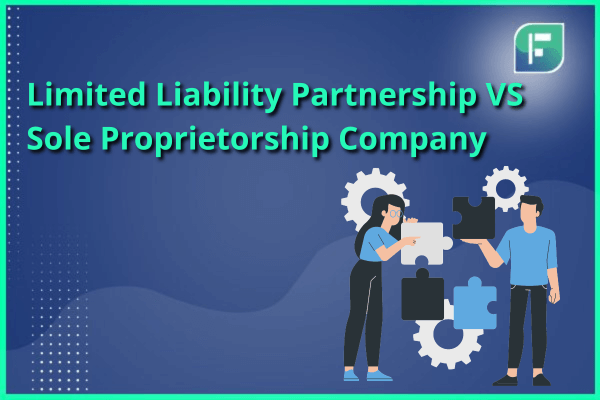Limited Liability Partnership firm Registration and Sole Proprietorship Firm registration are the two very distinct forms of entities. LLPs are governed by the law of LLP that came in 2008 on the other hand there is no particular law that is solely responsible for the operation and management of the sole proprietorship firm. If you compare Limited Liability Partnership vs Sole Proprietorship company, you will come to know that there is no comparison between them. They are totally different from each other. Both are suitable for the different types of business entities. The current blog will talk about the Limited Liability Partnership vs Sole Proprietorship company in detail. It will help you out to know about both of them and their applicability. In order to know about these business entities you must continue this blog till its last paragraph.
What do you Mean by LLP and Sole Proprietorship company?
Although Limited Liability Partnership and Sole Proprietorship companies are very different, sometimes business owners are confused choosing between them. Hence for the better understanding of Limited Liability Partnership vs Sole Proprietorship company, it’s important to know about them separately first. Given below is the description of both the entities:
Limited Liability Partnership Firm
Limited Liability Partnership Firms, or LLPs for short, were created by the Limited Liability Partnership Act of 2008. This kind of business organization is developed by two or more partners. It is a modern interpretation of partnership firms. Businesses and partnership firms are combined in this type of structure. The online LLP formation process is aided by the Ministry of Corporate Affairs. Partners in limited liability partnerships are released from obligations pertaining to the firm due to their separate legal liabilities. The partners’ liability does not equal the LLP’s liabilities. This kind of business model has been adopted by companies with two or more partners because, first of all, their activities are more sophisticated and not limited to a single location.
Sole Proprietorship Firm
A sole proprietorship is a type of business where one person manages the entire enterprise. The whole control of commercial matters is in the hands of one individual. The owner is the only party liable in this type of firm. Small business owners that operate their enterprises on a small scale are the ones that typically use these kinds of corporations. Some people confuse the ideas of personal companies and proprietorship firms. However, these are two distinct entity kinds that are appropriate for two different kinds of enterprises.
Advantages of the LLP and Sole Proprietorship Company
Some of the key benefits of the Limited Liability Partnership vs Sole Proprietorship company are mentioned below:
| Limited Liability Partnership Firm | Sole Proprietorship Firm |
| Simply incorporated using an online process through the Ministry of Corporate Affairs. | Simple and quick incorporation because no registration is necessary anywhere |
| Its operations are governed by appropriate legislation. | No regulating legislation, hence no restrictions |
| Permits an infinite number of partners since an LLP’s maximum number of partners is unrestricted. | A proprietorship firm has just one owner who is in total control of the business |
| Assets for business and personal use are distinct. | Combining personal and business assets |
| There is an appropriate registration for the LLP | It’s not necessary to register. |
Comparison of Limited Liability Partnership vs Sole Proprietorship Company
Understanding the distinctions between Limited Liability Partnership and Sole Proprietorship company is crucial for business owners in choosing the most suitable structure for their ventures. Some of the points with respect to the comparison between the Limited Liability Partnership vs Sole Proprietorship company are mentioned below:
| Particulars | Limited Liability Partnership Firm | Sole Proprietorship Firm |
| Incorporation | Limited-Liability Company Under the Companies Act, firms are incorporated in the same manner as other companies. The MCA website is where you can finish the online incorporation process in its entirety. | One person businesses operate as sole proprietorships, and they are exempt from all registration requirements when incorporating. |
| Documentation | Their legal requirements include extensive documentation and paperwork. A single missing document prevents the LLP from being incorporated. | In comparison, their paperwork and documentation are simple. |
| Liability | Partners and firms have different responsibilities because they are separate legal entities. | Since the proprietor is the only one in charge of running the business and managing it, he bears all liability in this situation. |
| Governing Law | The 2008 Limited Liability Partnership Act | Not a different governing legislation |
| Members | There is no upper limit on the number of partners; a minimum of two is needed. | There is just one owner, not more than that. |
| Suitability | Large, well-established companies that are not confined to one location | Small companies confined to a specific location |
Conclusion
Limited Liability Partnership vs Sole Proprietorship company have many distinct features. They are distinct business entities with different structures and regulations. An LLP, governed by the Limited Liability Partnership Act of 2008, is suitable for larger, well-established companies with activities not confined to a specific location. It allows for separate legal identities, offers limited liability for partners, and requires thorough documentation for incorporation. On the other hand, a Sole Proprietorship Firm, with a single owner managing the entire business, is apt for small enterprises operating in a specific location. It involves simple and quick incorporation without the need for specific governing legislation or extensive paperwork, but bears the disadvantage of combining personal and business assets, leading to the proprietor assuming all liability. It is essential for business owners to comprehend the differences between Limited Liability Partnership vs Sole Proprietorship company.






